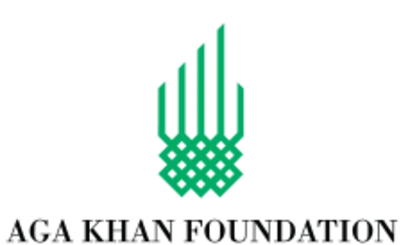
Aga Khan Foundation
- About the Aga Khan Development Network
The Aga Khan Development Network (AKDN) is a network of private, non-denominational development agencies that share a mission to improve the living conditions and opportunities for marginalised communities across 30 countries in Africa and Asia. Through innovative, community-driven solutions that span social, economic, and cultural dimensions, AKDN agencies aim to holistically improve quality of life.
AKDN’s education goal is to ensure all girls. boys, women, and men, are equipped with the knowledge, skills, attitudes, and values to help them interact effectively with the world and be contributing members of a pluralistic society. AKDN assumes a holistic and systems approach to education programming ensuring all interventions are globally informed, locally rooted, are embedded in government and community interests and structures, and work to promote social inclusion, equity, and pluralism. AKDN invests in all sectors of the formal education systems, from pre-primary to tertiary, as well as in other formal and informal life-long learning opportunities, including teacher professional development. AKDN education agencies operating in East Africa are the Aga Khan Foundation (AKF) and its affiliate, the Madrasa Early Childhood Programme (MECP), Aga Khan University (AKU), Aga Khan Academies (AKA), and Aga Khan Education Services (AKES).
Aga Khan Foundation
The Aga Khan Foundation (AKF), founded by His Highness the Aga Khan in 1967, is a member of the Aga Khan Development Network (AKDN), one of the world’s leading poverty solutions networks. AKDN’s integrated approach makes long-term investments, builds permanent institutions, and cultivates an active civil society, impacting tens of millions of people annually in 30 countries. Alongside its sister AKDN agencies, AKF implements innovative, community-driven solutions that are based in decades of experience, learning and evaluation. In East Africa (EA), AKF is managing a robust and expanding portfolio of multi-sectorial initiatives that includes investments in education, early childhood development, sustainable economic development, and civil society strengthening.
Schools2030
AKF, in partnership with a global consortium of private foundations, is implementing Schools2030, a ten-year (2020-2030) participatory learning improvement program based in 1000 government schools across ten countries. Using the principles of human-centred design (HCD) and focusing on the key transition years of ages 5, 10 and 15 years old, Schools2030 supports teachers and students to design and implement micro innovations. These low-cost and scalable innovations inform and transform education systems to improve holistic learning outcomes for the most marginalized learners worldwide. Across East Africa, Schools2030 partners with 300 schools per year. Having recently shifted to a demand driven process, 100 teachers and ~10 youth partners/CSOs apply to be a part of the design process, annually, reflecting roughly 15-20 design teams per country.
The goal of the intervention is that by 2030, Schools2030 will have contributed to 10 country governments to accelerate their progress in achieving SDG4 and SDG8:
- SDG4 – Ensure inclusive and equitable quality education and promote lifelong learning opportunities for all.
Ultimately, the project will ensure that 500,000 (150,000 in EA) marginalised children and youth in ten countries over ten years are equipped with the knowledge, skills, attitudes and values to help them interact effectively with the world and become contributing members of a pluralistic society.
AKF, as the Global Secretariat of Schools2030, leads the delivery of Schools2030 in Tanzania, Kenya, Uganda and will be representing all the Founding Partners through the Schools2030 Coordinator. Therefore, the Learning Partner will be accountable to AKF East Africa through signing a fixed-term Service Agreement Contract.
Schools2030 works with 300 sites/year across East Africa. The partner is expected to engage directly with all sites in a year (covering the three age cohorts: ECD, Primary, Secondary and youth partners/CSOs) and incubator sites, as follows:
- Kenya: 100 learning sites Mombasa and Lamu County
- Tanzania: 130 sites in Lindi and Dar Es Salaam and Zanzibar
- Uganda: 100 sites in Arua and Kampala
- ~20 Incubator Sites testing innovations from 2021, 2022, and/or 2023
The sample sites are subject to change annually to ensure coverage of all 100 sites by the end of the partnership. Over the course of the year, the learning partner is expected to examine and determine the efficacy of the Schools2030 HCD testing process and evidence generation as a means to support teachers to design classroom solutions based on problems to be solved.
Schools2030 Design Process
The Schools2030 classroom and learning innovations design process starts with a 12-14 week innovation phase. This phase involves the following:
- 3-4 day in person workshop to explore the challenge, ideate, and prepare for testing their prototype.
- 12 weeks of testing with a coach to generate evidence and iterate their innovations through the lens of its desirability, feasibility, and viability.
- A two-day workshop to review evidence, learn from each other, and funnel high-potential innovations for incubation
- At the end of the innovation phase, it is expected that teachers will have run several mini experiments leveraging the following tools and support: an evidence gathering tool and a coach to help them plan and interpret their testing
- Partners: Oxford Measured & ECD Measured
Following the innovation phase, select prototypes and teachers engage in the incubation phase. This phase involves the following:
- 3-4 months of incubation where teachers are supported to generate more evidence of the desirability, feasibility, and viability of their innovation at ‘scale’
- During this phase, teachers are supported by AKF staff and coaches, and leverage the Schools2030 Incubation Framework to guide their testing and learning process.
Following Incubation, select prototypes are supported to scale, which involves the following:
- Evidence generated from incubation, which would include an ability to demonstrate causality, per Nesta’s Standards of Evidence
- Identified scaling pathways within AKF/Aga Khan Development Network and/or government, and the private sector to support uptake of proven solutions within and outside AKF schools.
Work to Date
- Process learning – two prior learning partners focused on generating insights related to the HCD process for facilitators and teachers.
- Testing process and tools – focused on testing the desirability, feasibility and viability of the teacher’s innovation, supported by a design coach, and evidence gathering tool.
- Incubation framework – co-created by the Schools2030 and pre-tested with teachers focused on generating evidence to increase standards of evidence needed to scale innovations.
We are now in need of a learning partners to understand the history and evolution of the process learning and adaptations to date, while shifting our focus to how teachers are generating and learning from evidence as they test and incubate their classroom and learning innovations.
Research Questions to Answer
- Can teachers generate and understand evidence to iterate their idea based on their findings in the innovation phase?
- What are the conditions required to enable teachers to innovate and incubate?
- Can teachers successfully incubate their ideas to generate evidence at scale?
- Can teachers develop evidence of application, adaptation, and impact at ‘scale’?
- What impact are the innovations and solutions having on learning environments and learning outcomes?
- What impact is the process having on teacher ‘ownership’?
- What trends are emerging across the three countries and what does that mean in terms of the future of our approach to innovation, incubation, and scale.
Role of the learning partner.
The learning partner will be engaged in the following key activities:
- Review and synopsis of the reports from 2021-2023 HCD journey: A synopsis of the learning and adaptations to date with a particular emphasis on Kenya’s approach.
-
Country Specific Reports:
- Understand and support how teachers are using the evidence gathering tool and linking evidence and learning to moving along Nesta’s Standards of Evidence
- Understand how AKF and teachers are moving to and through incubation to elevate standards of evidence for scale.
- Link evidence generated to impact on learning environments and outcomes, with support from Oxford Measure and ECD Measured.
- Understand the impact of the process on teachers’ ‘agency’.
-
Trends Report:
- Identify and aggregate key themes across the region from the identified research questions, including recommendations for changes to the innovate, incubation and scaling approaches.
To achieve the above it is expected for the learning partner to:
- Participate in HCD workshops and any others as determined necessary.
- Participate in Schools2030 events including the National Design Workshop and Innovation in Education Showcase Events.
- Commit a senior staff representative to participate in the Schools2030 National Advisory Committee.
- Work collaboratively with AKF and other Schools2030 partners to capture and make meaning of data from sites and for communication to stakeholders. The learning partner is expected to lead on data collection and analysis from identified learning sites.
- Coordinate monthly catch-up meetings with the Schools2030 coordinator and other AKF and non-AKF representatives as deemed necessary.
Duration
The partnership will be valid from 1st March – 31st December 2024, with a possibility of extension based on mutual agreement. Funds will be disbursed in instalments and the said budget is reflected on an indicated duration.
Budget
The budget will be based on a need to complete the deliverables but will not exceed the pre-approved budget under AKF’s Schools2030 budget.
Expected deliverables.
- Schools2030 report including:
- Synopsis Report – Compiling three prior learner partner process learning reports
- Country Report (x3) – Assessment of the innovation evidence journey, assessment of teachers ability to link learning to higher order evidence through incubation, impact of prototypes on learning environment and learning outcomes, impact of the process on teachers ‘agency’
- Regional trends and recommendations report
- Active participation in workshops, as required
- Active participation in the National Advisory Committee as per NAC Terms of Reference.
Activity schedule:
Most of the activities are likely to be done remotely.
SN Date Activity
- March 2024 Signing a partnership agreement for assignment.
- March 2024 Inception plan
- April 2024 Orientation meeting with the reporting partner to brief on activities/work plan
- April 2024 Introductory meeting for reporting partner to partnering learning sites
- April 2024 Prior learning Synopsis Report
- July 2024 Learning Site Visits & Country Reports x3
7 . August 2024 Draft submission regional trends and recommendations report
8. August 2024 Review meeting with AKF on draft report
9. September Final report submission
Qualifications and Experience Required
AKF is seeking an experienced and committed partner with extensive knowledge of doing different studies and assessments to inform learning. The partners should have human resources (the team with capacity and related expertise) to carry out this assignment.
How to apply
Application Procedure
All interested partner must submit the following documents in a folder, to Aga Khan Foundation East Africa through email to [email protected] by end of day on the 20th of March, 2024. Please mention the title of the **‘Learning and Reporting Partner’**in your email subject.
- A detailed write up, describing their understanding of the assignment, possible study approach and methods.
- A detailed financial proposal indicating all expenses associated, including travel costs, with task and professional fees.
- The relevant institutional experience on similar assignments, including competencies in both data collection, analysis and report writing. If a partner is submitting, CVs for each staff of the team identified for this assignment should be included.
- Copies of relevant legal documents mandating existence and operations such as Registration Certificates, Business license and Tax Certificates will be required.
Please note that only shortlisted candidates will be contacted. Applications without all relevant documents will not be considered.
AKF Is an Equal Opportunity Employer and is Committed to Safeguarding and Promoting the Welfare of Children and Vulnerable Adults and Expects all Staff and Partners to Share this Commitment.
The Aga Khan Foundation is an agency of the Aga Khan Development Network (www.akdn.org).
Deadline: 20 Mar 2024

